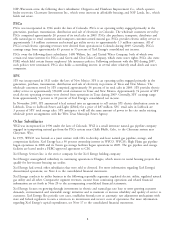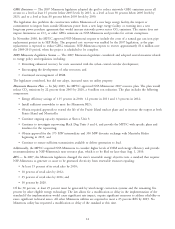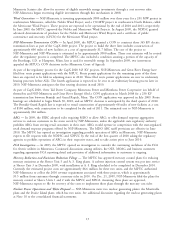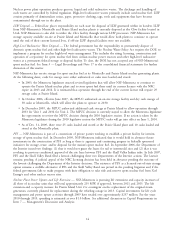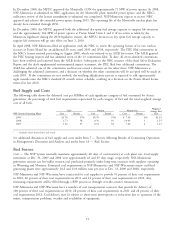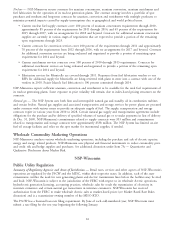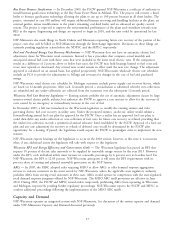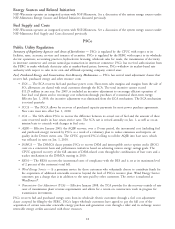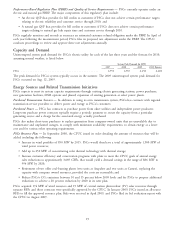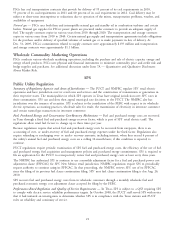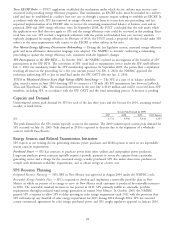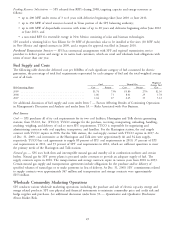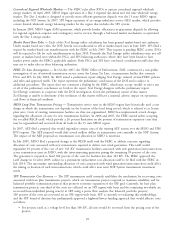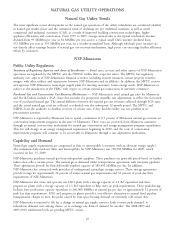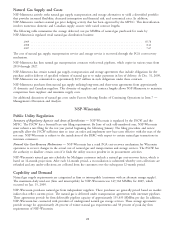Xcel Energy 2009 Annual Report Download - page 28
Download and view the complete annual report
Please find page 28 of the 2009 Xcel Energy annual report below. You can navigate through the pages in the report by either clicking on the pages listed below, or by using the keyword search tool below to find specific information within the annual report.Energy Sources and Related Initiatives
NSP-Wisconsin operates an integrated system with NSP-Minnesota. See a discussion of the system energy sources under
NSP-Minnesota Energy Sources and Related Initiatives discussed previously.
Fuel Supply and Costs
NSP-Wisconsin operates an integrated system with NSP-Minnesota. See a discussion of the system energy sources under
NSP-Minnesota Fuel Supply and Costs discussed previously.
PSCo
Public Utility Regulation
Summary of Regulatory Agencies and Areas of Jurisdiction — PSCo is regulated by the CPUC with respect to its
facilities, rates, accounts, services and issuance of securities. PSCo is regulated by the FERC with respect to its wholesale
electric operations, accounting practices, hydroelectric licensing, wholesale sales for resale, the transmission of electricity
in interstate commerce and certain natural gas transaction in interstate commerce. PSCo has received authorization from
the FERC to make wholesale electricity sales at market-based prices; however, PSCo withdrew its market-based rate
authority with respect to sales in its own and affiliated operating company control areas.
Fuel, Purchased Energy and Conservation Cost-Recovery Mechanisms — PSCo has several retail adjustment clauses that
recover fuel, purchased energy and other resource costs:
•ECA — The ECA recovers fuel and purchase power costs. Short-term sales margins and margins from the sale of
SO2 allowances are shared with retail customers through the ECA. The total incentive cannot exceed
$11.25 million in any year. For 2009, it included an incentive adjustment to encourage efficient operation of
base load coal plants and to encourage cost reductions through purchases of economical short-term energy.
Effective Jan. 1, 2010, the incentive adjustment was eliminated from the ECA mechanism. The ECA mechanism
is revised quarterly.
•PCCA — The PCCA allows for recovery of purchased capacity payments for most power purchase agreements.
New rates went into effect Jan. 1, 2010.
•SCA — The SCA allows PSCo to recover the difference between its actual cost of fuel and the amount of these
costs recovered under its base steam service rates. The SCA rate is revised annually on Jan. 1, as well as on an
interim basis to coincide with changes in fuel costs.
•AQIR — Effective January 2003, the AQIR recovers, over a 15-year period, the incremental cost (including fuel
and purchased energy) incurred by PSCo as a result of a voluntary plan to reduce emissions and improve air
quality in the Denver metro area. The CPUC approved PSCo’s filing to roll the AQIR into base rates, which
was reflected in rates on Jan. 1, 2010.
•DSMCA — The DSMCA clause permits PSCo to recover DSM and interruptible service option credit (ISOC)
costs on a concurrent basis and performance initiatives based on achieving various energy savings goals. The
CPUC approved recovery of the full amount of DSM-related costs through the combination of base rates and a
tracker mechanism in the DSMCA starting in 2010.
•RESA — The RESA recovers the incremental costs of compliance with the RES and is set at its maximum level
of 2 percent of the customer’s total bill.
•Wind Energy Service — Is a premium service for those customers who voluntarily choose to contribute funds for
the acquisition of additional renewable resources beyond the level of PSCo’s resource plan. Wind Energy Service
customers pay a charge that is in addition to the rates paid by other customers. The service is marketed as
WindSource.
•Transmission Cost Adjustment (TCA) — Effective January 2008, the TCA provides for the recovery outside of rate
cases of transmission plant revenue requirements and allows for a return on construction work in progress for
transmission investments.
PSCo recovers fuel and purchased energy costs from its wholesale electric customers through a fuel cost adjustment
clause accepted for filing by the FERC. PSCo’s larger wholesale customers have agreed to pay the full cost of the
acquisition of certain non-solar renewable energy purchase and generation costs through a rider and in exchange receive
renewable energy credits associated with those resources.
18


